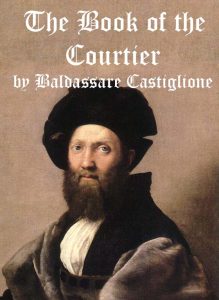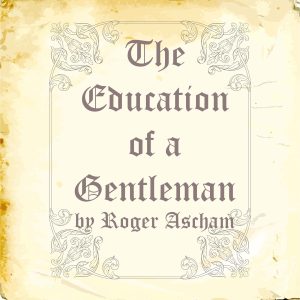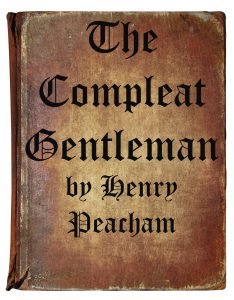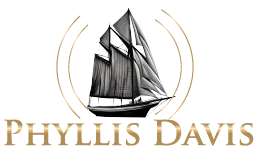Training a Gentleman
By Phyllis Davis
Throughout history, booklets and treatises have been written to promote societal refinement and personal social graces. These written works enormously impacted the European Renaissance era and encouraged people to dedicate themselves to a lifetime of learning and personal excellence.
Here are three popular historical books noted for their capacity to highlight the focus needed for their contribution to a more civilized world.

The Book of the Courtier by Castiglione
Baldassare Castiglione, The Book of the Courtier, 1528.
The author, Baldassare Castiglione was an Italian diplomat, soldier, and humanist during the Renaissance era.
The book delves into many themes as a guidebook for aspiring courtiers. He focused on training individuals who would spend their lives in the Court of Noblemen and Women of High Lineage.
- Social Interactions and Etiquette: To be part of the Court and know how to handle themselves easily and speak with others in a way that encourages goodwill and trust.
- High Morale Attributes: Impeccable virtues included dignity, generosity, and honesty to be practiced in Court.
- Physical fitness and Accomplishments in various arts: Horsemanship, athletic prowess, and courtly arts such as music and dancing.
- Study: Intellectual pursuit for learning: An emphasis on classical literature and an appreciation for the arts.
- Women in Court: Women’s education, refinement, and emphasis on the role of women in the Court.
- Breeding: Noble lineage and education for a life of good character and conduct in Court.

The Education of a Gentleman by Roger Ascham. 1570
In 1570, Roger Ascham’s work was published posthumously, The Education of a Gentleman by Roger Ascham. It was considered a mainstay for grooming and educating a man to be part of the English Renaissance. He defines a gentleman as “one that can live ordinately with himself, wisely with others, and godly with God.” He believed a man should spend his life developing his virtue, learning, and manners.
He was influenced by the humanist movement, which believed in classical learning and individual development through study, conversation, and travel.
His teachings focused on the following points he stressed for a man living in 1570:
- The importance of a good, experienced tutor who could inspire and challenge his students.
- The need for a well-rounded education.
- The benefits of learning Latin and Greek.
- The importance of good manners was a sign of inner virtue to help them create a harmonious society.
- The dangers of travel (especially for young men). He thought travel could lead to moral corruption and that young men should stay in their own country and learn from their elders.
Here are some excerpts from his book:
- “The chief thing that I would wish in a young gentleman, besides his natural wit and towardness, is a love of learning and a desire to profit therein.”
- “The best way to learn is to love what you learn.”
- “A gentleman should be able to speak and write correctly in both Latin and Greek.”
- “A gentleman should be courteous and well-mannered in all his dealings with others.”
- “A gentleman should be temperate in his habits and moderate in his desires.”

Henry Peacham, published The Compleat Gentleman, 1622
Another author, Henry Peacham, published The Compleat Gentleman, an early book in 1622 about ethics and etiquette in the 17th Century. He was an early guide for men in training on his topic. He believed a true gentleman was ‘one who was well-bred, accomplished in many things, and ‘has a natural disposition to virtue.’
A man should be skilled in the following areas, which is a glimpse into the year 1622:
- Physical fitness to defend himself, riding horses, fencing, and dancing.
- Honest, just, and virtuous.
- Manners, courteous, deportment, and conversation.
- Social Skills, courtesy, and well-mannered with all people.
- Able to speak and write well.
- Be knowledgeable about current events and classic literature.
- The Arts, music, painting, and poetry.
- The liberal arts, sciences, grammar, and rhetoric.
- Geometry and astronomy.
Again, these books were coveted during their time in history. Many of the books were written down after lectures or conversations to become memorialized and circulated among those in their communities.
After studying these books and putting them in perspective, it’s easy to see that the very basis of the Renaissance era was founded on these and other books and teachings.
Perhaps these teachings will again become a priority in today’s culture as a way of life to strive toward a life of integrity, virtue, and generosity. I know it has in my life.
If your company would like a Zoom training for an employee or an entire team with Phyllis Davis, Ethics and Etiquette Expert in American Business, please contact me and let me know how I can help you. 804-467-3752 EDT phyllis@etiquette-business.com Join me on LinkedIn


